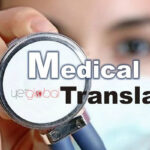Language barriers can be a significant hindrance in providing quality healthcare, especially in a diverse and multicultural society. In today’s globalized world, where patients come from various linguistic backgrounds, the need for accurate and reliable medical translation services has become paramount. Medical translation services bridge the gap between healthcare providers and patients who do not share a common language, ensuring effective communication and improving patient care. In this article, we will explore the importance of medical translation services, the challenges faced in the field, how these services enhance patient care, considerations for choosing the right provider, and the role of technology in medical translation. Let’s delve deeper into this vital aspect of healthcare.
The Importance of Medical Translation Services
In healthcare, clear and accurate communication is essential to provide the best possible care to patients. However, language barriers can impede effective communication between healthcare providers and patients, leading to misunderstandings, misdiagnoses, and potentially compromising patient safety. This is where medical translation services play a crucial role. These services involve the translation of medical documents, patient records, consent forms, and other healthcare materials from one language to another, ensuring that patients can fully understand their medical condition, treatment options, and any potential risks involved.
Medical translation services are not limited to written documents alone. They also encompass interpretation services, where trained interpreters facilitate communication between healthcare professionals and patients during appointments, consultations, and medical procedures. By providing accurate translations and interpretations, medical translation services enable healthcare providers to deliver personalized and culturally sensitive care to patients, regardless of their native language.
Challenges in Medical Translation
While medical translation services are vital for effective healthcare delivery, they come with their fair share of challenges. One of the primary challenges is the complexity and specificity of medical terminology. Medical professionals use specialized jargon that requires expert knowledge to accurately translate. Inadequate understanding of medical terminology can lead to errors, potentially compromising patient safety.
Another challenge is the need for cultural sensitivity in medical translations. Healthcare providers must consider cultural nuances and beliefs when communicating with patients from different backgrounds. Translators need to navigate these cultural intricacies to ensure accurate translations that respect patients’ cultural values and preferences.
How Medical Translation Services Improve Patient Care
Accurate and effective medical translation services have a profound impact on patient care. By breaking down language barriers, these services enable patients to fully understand their medical condition, treatment plans, and any potential risks. This understanding empowers patients to make informed decisions about their healthcare, leading to better treatment adherence and improved health outcomes.
Moreover, medical translation services promote patient safety by ensuring that healthcare providers have access to accurate medical records and patient history in the appropriate language. This helps prevent medication errors, allergic reactions, and other adverse events that can occur due to miscommunication or misunderstanding.
Choosing the Right Medical Translation Services Provider
Selecting the right medical translation services provider is crucial to ensure quality translations and effective communication. Here are some factors to consider when choosing a provider:
1. Expertise and Specialization:
Look for a provider that specializes in medical translations and has a team of translators with expertise in the medical field. They should have a thorough understanding of medical terminology and be familiar with the cultural sensitivities related to healthcare.
2. Quality Assurance:
Ensure that the provider has robust quality assurance processes in place. This may include proofreading, editing, and review by subject matter experts to ensure accurate and error-free translations.
3. Language Capabilities:
Verify that the provider offers translations in the languages you require. It is essential to choose a provider who can handle multiple languages to cater to the diverse needs of your patient population.
4. Turnaround Time:
Consider the provider’s turnaround time for translations, especially if you often require urgent or time-sensitive translations. A provider with quick turnaround times can ensure timely care for your patients.
5. Data Security:
Patient confidentiality is of utmost importance. Ensure that the provider has robust data security measures in place to protect sensitive medical information during the translation process.
The Future of Medical Translation Services
As technology continues to advance, the future of medical translation services looks promising. Machine learning and artificial intelligence are expected to play a more significant role in medical translation, further enhancing the accuracy and efficiency of translations. These technologies can help overcome the challenges of complex medical terminology and cultural nuances, leading to more precise and culturally sensitive translations.
Additionally, the demand for medical translation services is likely to increase as healthcare becomes more globalized and accessible to people from diverse linguistic backgrounds. Providers will need to adapt to this growing demand by expanding their language capabilities, adopting innovative translation technologies, and continually improving their quality assurance processes.
Conclusion
Medical translation services are an essential component of providing quality healthcare in a diverse and multicultural society. By bridging language barriers, these services enable effective communication between healthcare providers and patients, leading to improved patient understanding, safety, and overall care. When choosing a medical translation services provider, it is crucial to consider expertise, quality assurance processes, language capabilities, turnaround time, and data security.

